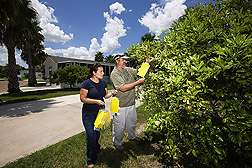Scientists study essential oils to attract asian citrus psyllid

(PhysOrg.com) -- Chemicals emitted by citrus plants and their relatives that attract Asian citrus psyllids are being tested by U.S. Department of Agriculture (USDA) scientists and their cooperators, and could help control the spread of citrus greening disease transmitted by the psyllids.
Entomologist Joseph Patt and his university colleagues are experimenting with petitgrain oils, essential oils used as perfume bases, to see which work best in mimicking the plant volatiles or scents emitted by flushing shoots, the new growth that appears on citrus trees after heavy rains. These volatiles may play an important role in helping the Asian citrus psyllid find suitable host plants on which to reproduce.
Patt works for the Agricultural Research Service (ARS) at the agency's Kika de la Garza Subtropical Agricultural Research Center in Weslaco, Texas. ARS is the USDA's principal intramural scientific research agency, and this research supports the USDA priority of promoting international food security.
A key aspect of developing a management system for psyllids is to find an attractant for baiting, trapping and killing the insects. The Asian citrus psyllid is commonly found on orange jessamine, a popular ornamental plant related to citrus. Patt and his collaborators analyzed the volatiles that make up orange jessamine's scent and formulated a synthetic mixture. Testing in the greenhouse proved the mixture was attractive to the psyllids. Details of this study were recently published in the scientific journal Environmental Entomology.
Because the psyllids also use sight to find food, the scientists tested the petitgrain oils on yellow-green-colored cards. Results from greenhouse studies showed the colored cards scented with the petitgrain oils attracted more psyllids than did unscented colored cards. With further research and development, this could be a possible method to help disseminate biological control agents to combat the psyllid in urban areas where widespread spraying of pesticides is forbidden.
Patt and his colleagues are conducting field tests to confirm their findings. They also are conducting additional studies to find the combination of scent components that is most attractive to the Asian citrus psyllid.
Provided by USDA Agricultural Research Service


















